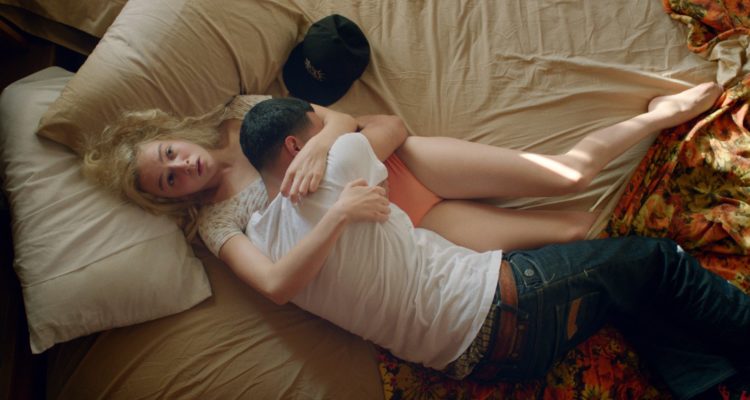“White Girl” is a movie you can’t easily shake off, not even days after you’ve seen it. It’s beyond brash, playing like “The Diary of a Teenage Girl” gone off to college and hooked on coke. The film is not a self-reflective melodrama, choosing instead to follow its lead character through a series of horrific crashes and burns on the unsympathetic streets of New York City.
Leah (Morgan Saylor) is an easy-going, thrill-seeking sophomore in college. Like many newcomers to NYC, she’s barely getting by, holding down a magazine internship and little else. Outside of routine work and thinly-veiled sexual harassment from her editor (Justin Bartha), Leah spends much of her free time in search of her next high. This leads her to an unlikely romance with Blue (Brian ‘Sene’ Marc), her corner dealer in Queens. The sensitive Puerto Rican pusher with a heart of gold is busted for dealing not long after their drug-addled meet cute, and now it’s up to the resident white girl to save her man from mandatory minimum sentencing laws.
Director Elizabeth Wood told the packed Sundance premiere crowd that the film was based largely on her own experience as a Midwestern kid falling in love with her NYC dealer. The movie’s self-awareness comes from hindsight. Leah’s naivety and sense of invincibility is rooted in her white privilege, but the film avoids any preachy monologues and instead contrasts her experience with that of her Latino friends. Both are guilty of dealing in clubs, with Leah and her magazine co-workers spending more to snort than to smoke, but all of the drug busts and profiling lands on Blue and his crew.
It’s not just the racial politics of the city that surface, but the sexual politics as well. Leah’s sleazy magazine boss trades her coke for a blow job within the first fifteen minutes of the film, and their intern-boss relationship deteriorates as the story continues. She turns to him for help to rescue Blue, but he’s not interested outside of scoring more coke, so she turns to a lawyer (Chris Noth) to make a last ditch effort to save Blue. “White Girl” hints that the indifferent attorney may be just as creepy as Leah’s boss with subtle gazes. When he finally does prey on her, it’s a stomach-churning scene that doesn’t cut away. It wants you to see this as another form of injustice.
The film is brisk in its pacing, and measured in its sequences. “White Girl” is given a music video aesthetic, with plenty of club scenes, popping music, and is intensely saturated with neon lights to give a sense we’re playing in Leah’s New York fantasies. Even the sun-drenched office interiors and hungover rides home look like shots from a gauzy short fit for a pop princess with a catchy slow jam. There’s not a lingering moment when the audience isn’t meant to be there. Wood’s direction is purposeful, bubbly bouncing from scene to scene until the bubble pops and Leah must deal with the consequences of her wanton actions. But the film avoids judging its wayward protagonist for something better: giving her a second chance and a life after trauma.
Perhaps what makes “White Girl” so divisive is its insistence on facing head on issues about the justice system, gentrification, power dynamics, and racial profiling. It can feel off at times to have these larger themes lurking in the background of raucous party where a topless Leah charges the DJ for his mic or jumps into a bathroom threesome. She searches to be carefree, yet throws herself whole-heartedly into saving her boyfriend from serious jail time, no matter the cost. It’s a strange bearing of responsibility that she clearly isn’t ready for, but you root for her to find her way. Perhaps it’s our own want to redeem some of our youthful mistakes that makes “White Girl” work. [B+]
Click here for our complete coverage from the 2016 Sundance Film Festival

